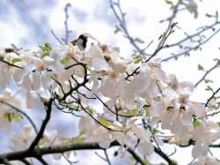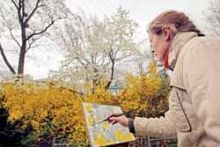A quarter of all Ukrainian women consider flowers to be the best present. Even if they expressed this desire right before March 8, International Women’s Day, but still. Flowers are an absolutely impractical present, but what would we give as a present, what would we rejoice in if there were no flowers? It turns out that we have an absolutely unconditional love for them, the kind of love that one could have only for something beautiful.
In order to understand this beauty and let it influence your inner condition, you have to be a sincere and spiritually developed person, which means being mature. Intelligence is not enough; you have to have something bigger — physicians call this “something” a field — so that your heart would freeze near Japanese sakuras in Uzhhorod, or that you’d go 50 kilometers to Lviv on weekend to feast your eyes on blooming magnolias, or that you’d go for a walk to the Hryshko Botanic garden in Kyiv, where both of these plants grow.
Unfortunately, in psychotherapy there is no such method as flower therapy. However, a person’s attitude to flowers and the place they have in his or her everyday life can say a lot about a person. Some people always have a fresh bouquet on their work desk, while others have pictures with flowers. There are people who have what they call a “green thumb” — flowerpots in their homes flourish, and there are people whose homes are surrounded by flowerbeds.
There is no doubt that such people are big romantics. I would praise not so much myself but my mother. When we still lived in a village, one year, in spring, on quite a big (nearly 10-acre) plot of land, she planted neither potatoes, nor corn, but flowers: dahlias, asters, zinnia, various marigolds, pinks, roses, and stocks. There was nearly everything in there! What beautiful lupine we had! Half of the village would come to ask why it grew so big by us and so little by them. Even buses would stop. (We lived near the road.) People would come out to look at our flowerbeds. If it were now, I am sure that my mother would try to grow a Japanese sakura or magnolia that come from South-Eastern Asia.
The beautiful is now in fashion. The beautiful is now expensive. Oligarchs and politicians (though probably a hyphen would be more relevant here than “and”) buy up all the antiques, imitative art masterpieces, unique items of folk life, and even build churches for themselves, because apparently they understand that even though they have everything and are rich, without the eternal, without the beautiful in life you are still a poverty.
Poverty with money, as Oksana Zabuzhko described their situation. However, we are now talking about flowers. Due either to the climate changes or to world globalization, it is now an ordinary thing to grow exotic plants in Ukraine. Thus, the abovementioned sakuras and magnolias grow in Kyiv, Drohobych, Chernivtsi, and in cities of Zakarpattia: in parks, arboretums, and in private homesteads. It is a great joy for botanists when plants that unusual for our latitude strike root here; ordinary people like it, too. That is why it would be better if the beautiful would be valuable, rather than expensive. And every person has to decide for himself in terms of what should be valuable for him.









